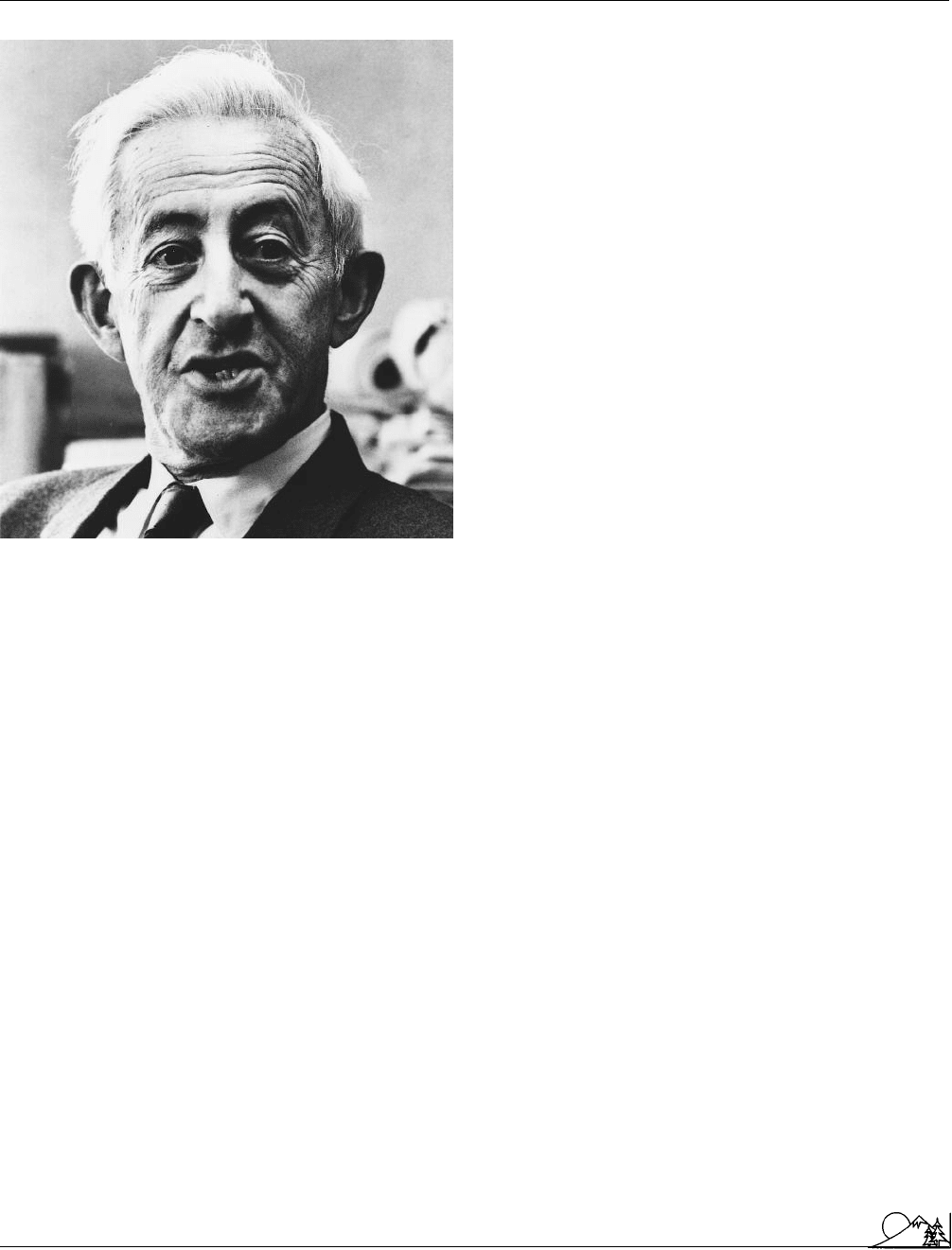Environmental Encyclopedia
Подождите немного. Документ загружается.


Environmental Encyclopedia 3
Wise use movement
Sellafield, a remote farm area of northern England, to supply
nuclear power
to the region. This early reactor was de-
signed with a large graphite block in which cans containing
the
uranium
fuel were embedded. The graphite served to
slow down fast-moving neutrons produced during
nuclear
fission
, allowing the reactor to operate more efficiently.
Graphite behaves in a somewhat unusual way when
bombarded with neutrons. Water, its modern counterpart,
becomes warmer inside the reactor and circulates to transfer
heat away from the core. Graphite, on the other hand, in-
creases in volume and begins to store energy. At some point
above 572°F (300°C), it may then suddenly release that
stored energy in the form of heat.
A safety system that allowed this stored energy to be
released slowly was installed in the Windscale reactor. On Oc-
tober 7, 1957, however, a routine procedure designed to re-
lease energy stored in the graphite cube failed, and a huge
amount of heat was released in a short period of time. The
graphite moderator caught fire, uranium metal melted, and
radioactive gases were released to the
atmosphere
. The fire
burned for two days before it was finally extinguished with
water.
Fortunately, the area around Windscale is sparsely
populated, and no immediate deaths resulted from the acci-
dent. However, quantities of radiation exceeding safe levels
were observed shortly after the accident in Norway, Den-
mark, and other countries east of the British islands. British
authorities estimate that 30 or more
cancer
deaths since
1957 can be attributed to
radioactivity
released during the
accident. In addition, milk from cows contaminated with
radioactive iodine-131 had to be destroyed. The British
government eventually decided to close down and seal off
the damaged nuclear reactor.
Four decades after the accident, Sellafield is still in
the news. In 1991, the
Radioactive Waste Management
Advisory Committee recommended that Sellafield be chosen
as the site for burying Britain’s high-, low-, and intermedi-
ate-level radioactive wastes. A complex network of tunnels
2,500 ft (800 m) below ground level would be ready to accept
wastes by the year 2005, according to the committee’s plan.
Although some environmental groups object to the
plan, many citizens do not seem to be concerned. In spite
of the high levels of radiation buried in the old plant, Sella-
field has become one of the most popular vacation spots for
Britons. See also High-level radioactive waste; Liquid metal
fast breeder reactor; Low-level radioactive waste; Radiation
exposure; Radiation sickness
[David E. Newton]
R
ESOURCES
B
OOKS
Dresser, P. D., ed. Nuclear Power Plants Worldwide. Detroit, MI: Gale
Research, 1993.
1527
P
ERIODICALS
Dickson, D. “Doctored Report Revives Debate on 1957 Mishap.” Science
(February 5, 1988): 556–557.
Goldsmith, G., et al. “Chernobyl: The End of Nuclear Power?” The Econo-
mist 16 (1986): 138–209.
Herbert, R. “The Day the Reactor Caught Fire.” New Scientist (October
14, 1982): 84–87.
Howe, H. “Accident at Windscale: World’s First Atomic Alarm.” Popular
Science (October 1958): 92–95+.
Pearce, F. “Penney’s Windscale Thoughts.” New Scientist (January 5, 1988):
34–35.
Urquhart, J. “Polonium: Windscale’s Most Lethal Legacy.” New Scientist
(March 31, 1983): 873–875.
Winter range
Winter range is an area that animals use in winter for food
and cover. Generally, winter range contains a food source
and thermal cover that together maintain the organism’s
energy balance through the winter, as well as some type of
protective cover from predators. Although some
species
of
animals have special adaptations, such as hibernation, to
survive winter climates, many must migrate from their sum-
mer ranges when conditions there become too harsh. Elk
(Cervus elaphus) inhabiting mountainous regions, for exam-
ple, often move from higher ground to lower in the fall,
avoiding the early snow cover at higher elevations. Nothern
populations of caribou or reindeer (Rangifer tarandus) often
travel over 600 mi (965 km) between their summer ranges
on the
tundra
and their winter ranges in northern wood-
lands. Still more extreme, the summer and winter ranges of
some animals are located on different continents. North
American birds known as
neotropical migrants
(including
many species of songbirds) simply fly to Central or South
America in the fall, inhabiting winter ranges many thousands
of miles from their summer breeding grounds.
WIPP
see
Waste Isolation Pilot Plan
Wise use movement
The wise use movement was developed in the late 1980s as
a response to the environmental movement and increasing
government regulation. A grassroots environmental move-
ment came about because of perceived impotence of federal
regulatory agencies to either regulate the continuing flow of
untested toxics into the
environment
or clean up the massive
mountain of accumulating waste through the Superfund law.
The wise use movement has begun to address these same
issues, but basically from a financial standpoint.

Environmental Encyclopedia 3
Wise use movement
Recognizing that cleanup is far more costly than antici-
pated and persisting in the belief that
public land
should
be available for business use, the wise use movement has
begun to garner a growing constituency. One of the major
new themes, for example, is that low exposures to
chemicals
and radiation are not harmful to humans or ecosystems, or
at least not harmful enough to warrant the billions of dollars
needed to protect and clean up the environment. Some com-
panies, rather than changing manufacturing processes or
doing research on less toxic chemicals, have chosen to con-
tinue doing business as usual and are among the leaders of
the wise use movement.
The oil, mining, ranching, fishing, farming, and
off-
road vehicles
industries—which are most affected by wet-
land regulation and restrictions on land use—also form a
constituency for the wise use movement. The fight for con-
trol over land is an old one. Traditionally, timber and mining
companies have sought unrestricted access to public lands.
Environmental groups such as the
Wilderness Society
, the
National Audubon Society
, the
Sierra Club
, and
the Na-
ture Conservancy
have fought to restrict access. This con-
troversy has been in open debate since at least 1877. At that
time, Carl Schurz, then Secretary of the Interior, proposed
the idea of national forests, which would be rationally man-
aged instead of exploited. Today, the debate between the
environmental and wise use movements represents little
more than the longstanding controversy over the best use
of public lands—the 29.2% of the total area of the United
States owned by the federal government. At present, the
wise use movement is most active in the western states with
regard to the debate over
land use
, but it is moving into
the East as well, where the movement is championed by
developers who want to abolish
wetlands
regulations.
At this point, several thousand small groups and count-
less individuals identify to some degree with the wise use
movement. They claim they are the only true environmental-
ists and label traditional environmentalists “preservationists
who hate humans.” The wise use aim is to gut all environ-
mental legislation on the theory that regulation has ruined
America by curtailing the rights of property owners. Many
wise use advocates avoid complexity by simply denying the
existence of many widely-accepted theories. For example,
some wise use leaders insist that the
ozone layer depletion
problem was manufactured by the National Aeronautics and
Space Administration (NASA) and isn’t a real threat.
The philosophy of the wise use movement is based
on a book by Ron Arnold and Alan Gottlieb, The Wise Use
Agenda (1988). The movement took a major step forward
after a conference held in Reno, Nevada in August of 1988,
sponsored by the Center for the Defense of Free Enterprise.
Funding for the conference came from large corporations
along with a number of right-wing business, political, and
1528
religious organizations. The conference was attended by
roughly 300 people from across the United States and Can-
ada, representing those industries that feel most threatened
by current regulation. These people became the activist
founders of the wise use movement. Calling themselves the
“new environmentalists,” they moved on to organize grass-
roots support.
The wise use movement has developed a 25-point
agenda, seeking to foster business use of
natural re-
sources
. Wise use goals are considered environmentally
damaging and are opposed by the traditional environmen-
talist movement. The wise use movement pursues the
development of
petroleum
resources in the
Arctic Na-
tional Wildlife Refuge
in Alaska. It advocates
clear-
cutting
of
old-growth forest
and replanting of public
lands with baby trees, the latter at government expense.
It aims to open public lands, including
wilderness
and
national parks, to mining and
oil drilling
. It seeks to
rescind all federal regulation of those
water resources
originating in or passing through the states, favoring state
regulation exclusively. The wise use movement further
advocates the use of national parks for recreational purposes
and a stop to all regulation that may exclude park visitors
for protective purposes. It opposes any further restrictions
on
rangelands
as livestock grazing areas. It advocates
the prevention and immediate
extinction
of all wildfires
to protect timber for commercial harvesting.
The above is but a sampling of the agenda of wise use
groups in the United States and abroad. The movement is
using established corporate structures as a base, which pro-
vide training and support to activists. Corporations are now
being joined by timber and
logging
associations, chambers
of commerce, farm bureaus, and local organizations. The
wise use movement is growing because of grassroots support.
Small farmers and ranchers and small mining and logging
operations have come under tremendous financial pressure.
Resources are dwindling, and costs are going up. With in-
creased mechanization, small business owners and their live-
lihoods are threatened. To give one example, government
scientists, after conducting five separate studies, recom-
mended that timber harvests in the Pacific Northwest’s an-
cient forests be reduced by 60% from what they were in the
mid-1980s. Loggers would not be able to cut more than
two billion board feet of wood a year from national forests
in Oregon and Washington. That is substantially below the
five billion-plus board feet the industry harvested on those
lands annually from 1983 to 1987, before the dispute over
protection of the
northern spotted owl
(Strix occidentalis
caurina) and old-growth forests wound up in court. The
wise use movement is one effort to rally behind the people
who risk the loss of work, and who may see
environmen-
talism
as their enemy.

Environmental Encyclopedia 3
Abel Wolman
In a strange irony, the grassroots activists of both
the environmental movement and the wise use movement
have much in common. The rank and file in the wise
use movement represent the same kinds of concerns for
environmental justice. Both sides see their well-being
threatened, whether in terms of property values, livelihoods,
or health, and have organized in self-defense. See also
Environmental ethics
[Liane Clorfene Casten and Marijke Rijsberman]
R
ESOURCES
B
OOKS
Gottlieb, A. M., and R. Arnold. The Wise Use Agenda. Bellevue, WA: Free
Enterprise Press, 1989.
O
THER
Mendocino Environmental Center Newsletter 12 (Summer/Fall 1992).
Rachel’s Hazardous Waste News (Environmental Research Foundation). Nos.
332, 335.
Abel Wolman (1892 – 1989)
American engineer and educator
Born June 10, 1892 in Baltimore, the fourth of six children of
Polish-Jewish immigrants, Wolman became one of the
world’s most highly respected leaders in the field of sanitary
engineering, which evolved into what is now known as
envi-
ronmental engineering
. His contributions in the areas of
water supply, water and
wastewater
treatment, public
health, nuclear reactor safety, and engineering education
helped to significantly improve the health and prosperity of
people not only in the United States but also around the world.
Wolman attended Johns Hopkins University, earning
a bachelor’s degree in 1913 and another bachelor’s in engi-
neering in 1915. He was one of four students in the first
graduating class in the School of Engineering. In 1937,
having already made major contributions in the field of
sanitary engineering, he was awarded an honorary doctorate
by the school. That same year he helped establish the Depart-
ment of Sanitary Engineering in the School of Engineering
and the School of Public Health, and served as its Chairman
until his retirement in 1962. As a professor emeritus from
1962 to 1989, he remained active as an educator in many
different arenas.
From 1914 to 1939, Wolman worked for the Maryland
State Department of Health, serving as Chief Engineer from
1922 to 1939. It was during his early years there that he made
what is regarded as his single most important contribution.
Working in cooperation with a chemist, Linn Enslow, he
standardized the methods used to chlorinate a municipal
drinking-water supply
.
1529
Although
chlorine
was already being applied to drink-
ing water in some locations, the scientific basis for the prac-
tice was not well understood and many utilities were reluctant
to add a poisonous substance to the water. Wolman’s techni-
cal contributions and his persuasive arguments regarding the
potential benefits of
chlorination
encouraged many munici-
palities to begin chlorinating their water supplies. Subse-
quently, the death rates associated with water-borne
com-
municable diseases
plummeted and the average life span
of Americans increased dramatically. He assisted many other
countries in making similar progress.
During the course of his long and illustrious career,
spanning eight decades, Wolman held over 230 official posi-
tions in the fields of engineering, public health, public works,
and education. He served as a consultant to numerous utili-
ties, state and local governments and agencies, and federal
agencies, including the U.S.
Public Health Service
, the
National Resources Planning Board, the
Tennessee Valley
Authority
, the
Atomic Energy Commission
, the U.S.
Geo-
logical Survey
, the
National Research Council
, the Na-
tional Science Foundation, the Department of Defense, the
Army, the Navy, and the Air Force.
On the international scene, Wolman served as an advi-
sor to more than 50 foreign governments. For many years
he served as an advisor to the World Health Organization
(WHO), and he was instrumental in convincing the agency
to broaden its focus to include water supply,
sanitation
,
and sewage disposal. He also served as an advisor to the Pan
American Health Organization.
Wolman was an active member of a broad array of
professional societies, including the
National Academy of
Sciences
, the National Academy of Engineering, the Ameri-
can Public Health Association, the American Public Works
Association, the American Water Works Association, the
Water Pollution
Control Federation, and the American
Society of Civil Engineers. His leadership in these organiza-
tions is exemplified by his service as President of the Ameri-
can Public Health Association in 1939 and the American
Water Works Association in 1942.
Known as an avid reader and a prolific writer, Wolman
authored four books and more than 300 professional articles.
For 16 years (from 1921 to 1937) he served as editor-in-
chief of the Journal of the American Water Works Association.
He also served as Associate Editor of the American Journal of
Public Health (1923–1927) and editor-in-chief of Municipal
Sanitation (1929–1935).
Wolman was the recipient of more than 60 profes-
sional honors and awards, including the Albert Lasker Spe-
cial Award (American Public Health Association, 1960), the
National Medal of Science (presented by President Carter,
1975), the Tyler Prize for Environmental Achievement
(1976), the Environmental Regeneration Award (Rene

Environmental Encyclopedia 3
Wolves
Abel Wolman. (The Ferdinand Hamburger Jr. Archives
of Johns Hopkins University. Reproduced by permission.)
Dubos Center for Human Environments, 1985), and the
Health for All by 2000 Award (WHO, 1988). He was an
Honorary Member of 17 different national and international
organizations, some of which named prestigious awards in
his honor.
He was greatly admired for his outstanding integrity
and widely known for the help and encouragement he gave
to others, for his keen mind and sharp wit (even at the age
of 96), for his willingness to change his mind when con-
fronted with new information, and for his devotion to his
family. His wife of 65 years, Anne Gordon, passed away in
1984. Wolman’s son, Gordon, is Chairman of the Depart-
ment of Geography and Environmental Science at Johns
Hopkins University.
[Stephen J. Randtke]
R
ESOURCES
B
OOKS
Wolman, Abel. Water, Health and Society: Selected Papers, edited by G. F.
White. Ann Arbor, MI: Books on Demand.
P
ERIODICALS
National Academy of Engineering of the United States of America. Memo-
rial Tributes 5. Washington, DC: National Academy Press, 1992.
ReVelle, C. “Abel Wolman, 1892–1989.” EOS 70 (29 August 1989).
APWA Reporter 56 (October 1989): 24–5.
1530
Wolves
Persecuted by humans for centuries, these members of the
dog family Canidae are among nature’s most maligned and
least understood creatures. Yet they are intelligent, highly
evolved, sociable animals that play a valuable role in main-
taining the
balance of nature
.
Fairy tales such as “Little Red Riding Hood” and “The
Three Little Pigs” notwithstanding, healthy, unprovoked
wolves do not attack humans. Rather, they avoid them when-
ever possible. Wolves do prey on rabbits, rodents, and espe-
cially on hoofed animals like deer, elk, moose, and caribou.
By seeking out the slowest and weakest animals, those that
are easiest to catch and kill, wolves tend to cull out the sick
and the lame, very old and young, and the unwary, less
intelligent, biologically inferior members of the herd. In this
way, wolves help ensure the “survival of the fittest” and
prevent overpopulation, starvation, and the spread of diseases
in the prey
species
.
Wolves have a disciplined, well-organized social struc-
ture. They live in packs, share duties, and cooperate in
hunt-
ing
large prey and rearing pups. Members of the pack,
often an extended family composed of several generations
of wolves, appear to show great interest in and affection for
the pups and for each other, and have been known to bring
food to a sick or injured companion. It is thought that the
orderly and complex social structure of wolf society, espe-
cially the submission of members of the pack to the leaders,
made it possible for early humans to socialize and domesti-
cate a small variety of wolf that evolved into today’s dogs.
The famous howls in which wolves seem to delight appear
to be more than a way of establishing territory or locating
each other. Howling seems to be part of their social culture,
often done seemingly for the sheer pleasure of it.
Nevertheless, few animals have withstood such univer-
sal, intense, and long–term persecution as have wolves, and
with little justification. Bounties on wolves have existed for
well over 2,000 years and were recorded by the early Greeks
and Romans. One of the first actions taken by the colonists
settling in New England was to institute a similar system,
which was later adopted throughout the United States. Sport
and commercial
hunting and trapping
, along with federal
poisoning
and
trapping
programs—referred to as “predator
control"—succeeded in eliminating the wolf from all of its
original range in the contiguous 48 states excepting Minne-
sota, until its later reintroduction.
The
U.S. Department of the Interior
, at the urging
of conservationists, has undertaken efforts to reestablish wolf
populations in suitable areas, like
Yellowstone National
Park
. In 1995, the 14 wolves were released to roam the park.
The group adapted extremely well and multiplied quickly. In
1997, nearby ranchers, concern that the wolves could become

Environmental Encyclopedia 3
Wolves
a threat to their livestock, filed a lawsuit to block further
wolf releases. However, in 2000, a federal court upheld the
releases. By 2002, there were more than 150 wolves in the
park.
American timber wolves continued to be hunted and
trapped, legally and illegally, in their remaining refuges.
Alaska has periodically allowed and even promoted the aerial
hunting and shooting of wolves and has proposed plans to
shoot wolves from airplanes in order to increase the numbers
of moose and caribou for sport hunters. One such proposal
announced in late 1992 was postponed and then cancelled
after
conservation
and
animal rights
groups threatened
to launch a tourist boycott of the state.
In Minnesota, wolves are generally protected under
the federal
Endangered Species Act
, but
poaching
persists
because many consider wolves to be livestock killers. In 1978,
the wolves were reclassified from endangered to threatened,
which afforded them less protection. However, the U.S.
Fish
and Wildlife Service
(FWS) adopted a recovery plan in
1978 with the goal of increasing the Minnesota wolf popula-
tion to 1,400 by 2000. By 1999, the population was estimated
at 2,445 by the FWS although several
wildlife
groups be-
lieved the number was much less. Wolves were also success-
fully reintroduced into Wisconsin and Michigan, where the
population was estimated by the FWS at more than 100 in
1994. As of 2002, the FWS was considering delisting the
Minnesota wolf from protection under the Endangered Spe-
cies Act.
In Canada, they are frequently hunted, trapped, poi-
soned, and intentionally exterminated, sometimes to increase
the numbers of moose, caribou, and other game animals,
especially in the provinces of Alberta and British Columbia,
and the Yukon Territory. The maned wolf, (Chryocyon
brachyurus) is considered endangered throughout its entire
range of Argentina, Bolivia, Brazil, Peru, and Uruguay. In
Norway, there were only 28 wolves in the wild as of 2002,
according to the
World Wildlife fund
. The number in Swe-
den was less than 100.
The most common type of wolf is the gray wolf (Canis
lupus) that includes the timber wolf and the Arctic-dwelling
tundra
wolf. The FWS lists the gray wolf as an endangered
species throughout its former range in Mexico and the conti-
nental United States, except in Minnesota, where it is
“threatened.” As many as 1,300 wolves may remain in the
wilds of Minnesota, 6,000–10,000 in Alaska, and thousands
more in Canada. A population ranging from one or two
dozen also lives on Isle Royale, Michigan.
The red wolf (Canis rufus), a smaller type of wolf found
in the southeastern United States, was nearly extinct in the
wild when in 1970 the FWS began a recovery program.
With less than 100 red wolves in the wilds of Texas and
Louisiana, 14 were captured and became part of a captive
1531
Red wolf, Smoky Mountains National Park.
(Photography by Tim Davis. Photo Researchers Inc. Repro-
duced by permission.)
breeding program. By 2002, about 100 red wolves had been
reintroduced into the wilds in North Carolina, but are still
listed as Critical by the
IUCN—The World Conservation
Union
. A federal appeals court helped the effort when in
1970 it upheld FWS rules banning the killing of red wolves
that wander onto privately–owned land.
In 1998, the FWS reintroduced the Mexican wolf
(Canis lupus baileyi), a sub-species of the gray wolf, into the
Apache
National Forest
in Arizona after it had been gone
from the wild for 17 years. Two wolf families were released
but the reintroduction suffered setbacks when five of the
wolves were shot and killed by ranchers. The remaining
wolves were recaptured in 2002 and relocated to the Gila
National Forest and Gila
Wilderness
Area of New Mexico.
The FWS hopes to have reestablished 100 Mexican wolves
in the area by 2005. Less than 200 of the wolves survive in
captivity. The Mexican wolf was declared an
endangered
species
in 1976.
[Ken R. Wells]
R
ESOURCES
B
OOKS
Greenberg, Daniel A. Wolves. New York: Benchmark Books, 2002.
Martin, Patricia A. Fink. Gray Wolves. New York: Children’s Press, 2002.

Environmental Encyclopedia 3
World Bank
Mech, L. David. The Wolves of Minnesota: Howl in the Heartland. Stillwater,
MN: Voyageur Press, 2000.
P
ERIODICALS
Clugston, Michael. “Intruding on Wild Lives.” Canadian Geographic (No-
vember–December 2001): 38.
“Defenders Applauds Decision to Translocate Mexican Wolves.” US New-
swire (March 22, 2000).
Holloway, Marguerite. “Wolves at the Door: Can We Learn to Dance
With Wild Things Again?” Discover (June 2000): 58.
Jones, Karen. “Fighting Outlaws, Returning Wolves.” History Today (March
2002): 38–41.
Knight, Deborah. “Uneasy Neighbors: Humans Evicted Wolves from Yel-
lowstone and Coyotes Moved In. Now the Wolves are Back.” Animals
(Spring 2002): 6–11.
O
RGANIZATIONS
International Wolf Center, 1396 Highway 169, Ely, MN USA 55731
(218) 365-4695, Email: wolfinfo@wolf.org, <http://www.wolf.org>
Woodpecker
see
Ivory-billed woodpecker
George Masters Woodwell (1928 – )
American ecologist
A highly respected but controversial
biosphere
ecologist
and biologist, Woodwell was born in Cambridge, Massachu-
setts. With his parents, who were both educators, Woodwell
spent most of his summers on the family farm in Maine,
where he was able to learn firsthand about biology,
ecology
,
and the
environment
.
Woodwell graduated from Dartmouth College in 1950
with a bachelor’s degree in zoology. Soon after graduation, he
joined the Navy and served for three years on oceanographic
ships. After returning to civilian life, he took advantage of
a scholarship to pursue graduate studies and earned both a
master’s degree (1956) and a doctorate (1958) from Duke
University. He began teaching at the University of Maine
and was later appointed a faculty member and guest lecturer
at Yale University. Throughout most of the 1960s and the
early 1970s, Woodwell worked as senior ecologist at the
Brookhaven National Laboratory. It was there that he con-
ducted the innovative studies on environmental
toxins
which earned him a reputation as a nonconformist ecologist.
In 1985, he founded the Woods Hole Research Center, a
leading facility for ecological research.
A pioneer in the field of biospheric
metabolism
,
Woodwell has worked to determine the effects of various
toxins on the environment. One of the many studies he
conducted examined the effects of
radiation exposure
on
forest ecosystems. He used a 14-acre (5.7 ha) combination
pine and oak forest as his testing area, and found that the
time needed to destroy an
ecosystem
is far less than that
1532
which is necessary to rejuvenate it. He continues to investi-
gate the effects of nuclear emissions on the environment.
Beginning in the 1950s, Woodwell worked with the
Conservation Foundation—now part of the World
Wildlife
Fund—in investigating the
pesticide
DDT. Woodwell and
his colleagues were the first to study the catastrophic effects
of the chemical on wildlife and, in 1966, were the first to
take legal action against its producers. DDT was banned in
the United States in 1972.
Much of Woodwell’s work has focused on the hazards
of the
greenhouse effect
. He has provided valuable infor-
mation for hearings on environmental issues, and has been
instrumental in developing similar data for the United States
and foreign government agencies. Not only is Woodwell
concerned about radiation,
chemicals
, and global warming,
but like
Paul Ehrlich
, he warns that
population growth
must be kept in balance with any ecosystem development.
While he does publish articles in professional journals,
Woodwell produces a number of works for more publications
with a broader audience. He considers it imperative that the
general population play a key role in saving the planet, and
his work has appeared in periodicals such as Ecology, Scientific
American, and the Christian Science Monitor.
Woodwell maintains membership in the
National
Academy of Sciences
and is a past president of the
Ecologi-
cal Society of America
. He is also a member of the
Environ-
mental Defense
Fund and
Natural Resources Defense
Council
. In 2001, Woodwell was awarded the Volvo Envi-
ronmental Prize.
[Kimberley A. Peterson]
R
ESOURCES
B
OOKS
Gareffa, P. M., ed. Contemporary Newsmakers—1987 Cumulation. Detroit,
MI: Gale Research, 1988.
Woodwell, George M., ed. Earth in Transition: Patterns and Processes of
Biotic Impoverishment. New York: Cambridge University Press, 1991.
———, et al. Ecological and Biological Effects of Air Pollution. New York:
Irvington, 1973.
P
ERIODICALS
Grady, D., and T. Levenson. “George Woodwell: Crusader for the Earth.”
Discover (May 1984): 44–6+.
Houghton, R. A., and G. M. Woodwell. “Global Climatic Change.” Scien-
tific American 260 (April 1989): 36–44.
Woodwell, George M. “On Causes of Biotic Impoverishment.” Ecology 70
(February 1989): 14–15.
World Bank
Affiliated with the United Nations, the World Bank was
formally established in 1946 to finance projects to spur the

Environmental Encyclopedia 3
World Bank
economic development of member nations, most notably
those in Europe and the
Third World
. The bank has been
strongly criticized by environmental and human rights
groups in recent years for funding Third World projects that
destroy rain forests, damage the
environment
, and harm
villagers and
indigenous peoples
.
The bank is headquartered in Washington, D.C. It is
administered by a board of governors and a group of executive
directors. The board of governors is composed principally
of the world’s finance ministers and convenes annually.
There are 21 executive directors who carry out policy matters
and approve all loans. The World Bank usually makes loans
directly to governments or to private enterprises with their
government’s guarantee when private capital is not available
on reasonable terms. Generally, the Bank lends only for
imported materials and equipment and services obtained
from abroad. The interest rate charged depends primarily
on the cost of borrowing to the Bank. The subscribed capital
of the bank exceeds $30 billion, and the voting power of
each nation is proportional to its capital subscription.
The 1970s represented a period of extensive growth
for the World Bank, both in the volume of lending and the
size of its staff. The staff was pressured to disperse money
quickly, and little real support for grassroots development
ever materialized within the institution. Local populations
were hardly ever consulted and rarely taken into account for
the majority of the enterprises the bank funded during this
period. As a result, billions of dollars of bank money was
managed ineffectively by domestic public institutions that
were often unrepresentative. The stated purpose of the loans
was to promote modernization and open economics, but the
lending network further supported the elite in the Third
World and prevented the poor from playing a meaningful
role in the policies that were so markedly reshaping their
environments.
The international debt crisis during this decade also
changed the bank, beginning its evolution into a debt-man-
agement institution when it lifted the restrictions on the non-
project lending that had been established by its founders. In
an effort to expedite its loan development, the bank under-
went a major reorganization in 1986. It consolidated its
activities under four senior vice presidents, but many consider
the net results of these changes to be far from successful.
The most notable critics of the World Bank have been
in the global environmental movement, but defects within
the bank’s operations complex have largely restricted their
campaigns from effecting major changes. The bank has re-
peatedly withheld the majority of the information it gener-
ates in the preparation and implementation of projects, and
many environmentalists continue to charge that it has be-
come an institution fundamentally lacking the accountability
and responsibility necessary for
sustainable development
.
1533
The way the World Bank handled the controversial
Narmada River Sandar Sarovar Dam project in India has
been called a case in point. According to the
Environmental
Defense
Fund, the history of bank involvement with the
project reveals an institution whose primary agenda is to
transfer money quickly, no matter what the cost in “system-
atic violation of its own environmental, economic and social
policies and deception of its senior management and Board
of Executive Directors.” United States Executive Director
E. Patrick Coady accused bank management and staff of a
cover-up in relation to the Sandar Sarovar Dam, and he
directly challenged the bank’s credibility, noting that “no
matter how egregious the situation, no matter how flawed
the project, no matter how many policies have been violated,
and no matter how dear the remedies prescribed, the bank
will go forward on its own terms.” Despite support from
Germany, Japan, Canada,
Australia
, and the Scandinavian
countries, Coady’s accusations were ignored. Bank manage-
ment continued to finance the dam until early 1993, when
criticism of the project became so intense that India decided
to finance the project itself. There was no plan to resettle
the 250,000 people who would be displaced.
Many argue that the failures of policies at the World
Bank are illustrated by other case studies in Brazil, Costa
Rica, and Ghana. In Brazil, International Monetary Fund
(IMF) stabilization programs have hit the poor particularly
hard and depleted the country’s
natural resources
. Al-
though these structural programs were designed to manage
Brazil’s tremendous foreign debt, critics argue they have
been socially, economically, and environmentally cata-
strophic. The “economic miracle” of the 1970s never materi-
alized for Brazil’s masses, despite the fact that the economy
grew more than any other country in the world between
1955 and 1980. Due largely to ill-conceived IMF and World
Bank advice, as well as ineffective leadership by the Brazilian
government, development decisions in Brazil have leaned
toward extravagant and poorly implemented projects. Many
major projects have failed miserably, only adding to lost
investments, and the environmental devastation caused by
such projects has been enormous, with much of it irreversible,
involving massive destruction of the
tropical rain forest
.
The Tucurui Dam project, for example, was part of
the Brazilian government’s plan to build some 200 new
hydroelectric power
dams
, most of them in the Amazonian
region. This project has destroyed thousands of acres of
tropical
rain forest
and degraded
water quality
in the
reservoir
and downstream, further lowering the income and
affecting the health of communities below the dam. For
environmentalists, Tucurui is representative of the problems
inherent in building large dams in tropical regions: “Opening
of forest areas leads to
migration
of landless people,
defor-
estation
of reservoir margins,
erosion
and
siltation
causing

Environmental Encyclopedia 3
World Bank
destruction of power-generating equipment and reduction
of its useful lifespan; spread of waterborne disease to human
and
wildlife
populations; and the permanent destruction of
fish and wildlife habitats, eliminating previously existing
local economic activity and unknown numbers of
species
of plants and animals.”
Ghana is usually touted by the World Bank and IMF
as a particularly successful example of structural adjustment
programs in Africa, but many believe that a closer examina-
tion reveals something different. The goal of the current
adjustment program was to reduce the fiscal deficit, inflation,
and external deficits by reducing domestic demand. A large
portion of this plan was “to reverse the decline in agricultural
production, restore overseas confidence in the Ghanian
economy, increase foreign-exchange earnings, restore ac-
ceptable living standards, control inflation, reform prices,
and reestablish production incentives for cocoa.” Although
cocoa production had increased 20% by 1988 as a result of
incentives in agricultural sector reform, with the income for
cocoa production increasing by as much as 700% in some
cases, cocoa farmers make up only 18% of Ghana’s farming
population. Furthermore, in recent decades a growing ineq-
uity within the cocoa-producing population has been docu-
mented. Half of the land cultivated for cocoa today is owned
by the top 7% of Ghana’s cocoa producers, while 70% own
farms of less than 6 acres (2.4 ha).
The timber industry in Ghana was also identified by
the IMF and World Bank as an additional source of foreign
exchange, and this led to the steady destruction of Ghana’s
forests. If timber production is maintained at its current
rate and without appropriate environmental controls, many
environmentalists and others believe that the Ghanian coun-
tryside will be stripped bare by the year 2000. The fishing
industry is also threatened. Rising costs have caused the
price of fish to increase while real wages have fallen. Gha-
nians receive 60% of their protein from the products of ocean
fisheries, and decreased fish consumption in considered one
of the leading factors in the rise of malnutrition in the
country.
While mounting public pressure might cause the bank
to reconsider some of its programs, reforms are possible only
if supported by those nations controlling more than half of
the Bank’s voting shares. And no matter what direction is
taken, many experts believe that internal contradictions will
continue to trouble the bank for years, further lowering the
morale of the staff. As long as the bank continues to place
priority on its debt-management functions, it will likely fail
to change its policy of making large-scale loans for question-
able and destructive projects. Overall quality may be further
diminished as developing nations continue to give up natural
resources for the rapid earning of foreign exchange. Debt
management could then force the bank to support large-
1534
scale, poorly-organized, and poorly-supervised projects,
while the staff would be pressed harder to address wider
development problems that could continue to be exacerbated
by other aspects of bank lending.
The World Bank’s dismal record of ignoring the inter-
ests of the poor and the environment clearly raises funda-
mental questions about the future of the institution. Envi-
ronmentalists, human rights groups, and other critics of the
Bank have offered the following suggestions for improving
its operations. While there are obvious reasons for keeping
some information confidential, they argue, the bank has
abused this right. Greater freedom of information is neces-
sary because participation with population groups in the
development process is impossible without public access.
Critics also argue for the establishment within the Bank of
an independent appeals commission, maintaining that there
is a clear need for a body that would hear and act on com-
plaints of environmental and social abuses. It has been sug-
gested that this commission could be made up of environ-
mentalists, academics, church representatives, human rights
groups, and others who would encourage the bank to empha-
size sustainable development and eliminate environmentally
destructive projects. And finally, it has been widely suggested
that project quality should be the first priority of the World
Bank, with the United Nations taking the lead in demanding
this. In short, many believe the bank should no longer be
allowed to function as a money-moving machine to address
macro-economic imbalances. See also Economic growth and
the environment; Environmental economics; Environmental
policy; Environmental stress; Green politics; Greens; United
Nations Earth Summit; United Nations Environment Pro-
gramme
[Roderick T. White Jr.]
R
ESOURCES
B
OOKS
Le Prestre, P. G. The World Bank and the Environmental Challenge. London:
Associated University Presses, 1989.
P
ERIODICALS
Payer, C. The World Bank: A Critical Analysis. New York: Monthly Review
Press, 1982.
World Commission on Environment
and Development
see Our Common Future
(Brundtland
Report)

Environmental Encyclopedia 3
World Resources Institute
World Conservation Strategy
The World Conservation Strategy (WCS): Living Resource
Conservation for Sustainable Development is contained in
a report published in 1980 and prepared by the International
Union for Conservation of Nature and Natural Resources
(now called
IUCN—The World Conservation Union
). As-
sistance and collaboration was received from the
United
Nations Environment Programme
(UNEP), the
World
Wildlife Fund
(WWF), the Food and Agriculture Organiza-
tion of the United Nations (FAO), and the United Nations
Educational, Scientific and Cultural Organization
(
UNESCO
).
The three main objectives of the WCS are: (1) to
maintain essential ecological processes and life-support sys-
tems on which human survival and development depend.
Items of concern include
soil
regeneration and protection,
the
recycling
of nutrients, and protection of
water quality
;
(2) to preserve genetic diversity on which depend the func-
tioning of many of the above processes and life-support
systems, the breeding programs necessary for the protection
and improvement of cultivated plants, domesticated animals,
and
microorganisms
, as well as much scientific and medical
advance, technical innovation, and the security of the many
industries that use living resources; (3) to ensure the sustain-
able utilization of
species
and ecosystems which support
millions of rural communities as well as major industries.
The WCS believes humans must recognize that the
world’s
natural resources
are limited, with limited capaci-
ties to support life, and must consider the needs of
future
generations
. The object, then, is to conserve the natural
resources, sustain development, and to support all life. Hu-
mans have great capacities for the creation of wants or needs
and also have great powers of destruction and annihilation.
Human action has global consequences, and thus global
responsibilities are crucial. The aim of the WCS is to provide
an intellectual framework as well as practical implementation
guidelines for achieving its three primary objectives.
The WCS has been endorsed by numerous leaders,
organizations, and governments, and has formed the basis
for preparation of National Conservation Strategies in over
fifty countries.
The World Conservation Monitoring Centre
(WCMC) mission is to support conservation and sustainable
development by providing information on the world’s
bio-
diversity
. It is a joint venture between the three main coop-
erators of WCS, IUCN, UNEP, and WWF.
The WCS has been supplemented and restated in a
document called Caring for The Earth: A Strategy for Sustain-
able Living, published in 1991. This document restates cur-
rent thinking about conservation and development and sug-
gests practical actions. It establishes targets for change and
1535
urges a concerted effort in personal, national, and interna-
tional relations. It stresses measuring achievements against
the objectives of actions.
The WCS of 1980 and the 1991 update have done
much to bring attention to the need for sustainable manage-
ment of the world’s natural resources. It outlines problems,
suggests needed changes, and stresses the need to quantitate
the progress in meeting the needs of a sustainable world.
See also Environmental education; Environmental ethics;
Environmental monitoring; Sustainable biosphere
[William E. Larson]
R
ESOURCES
O
THER
Caring for the Earth: A Strategy for Sustainable Living. Gland, Switzerland:
IUCN—The World Conservtion Union, 1991.
World Conservation Strategy. Gland, Switzerland: International Union for
the Conservation of Nature and Natural Resources, 1980.
World Resources Institute
An international environmental and resource management
policy center, the World Resources Institute researches ways
to meet human needs and foster economic growth while
conserving
natural resources
and protecting the
environ-
ment
. WRI’s primary areas of concern are the economic
effects of environmental deterioration and the demands on
energy and the environment
posed by both industrial and
developing nations. Since its inception in 1982, WRI has
provided governments, organizations, and individuals with
information, analysis, technical support, and policy analysis
on the interrelated areas of environment, development, and
resource management.
WRI conducts various policy research programs and
operates the Center for International Development and En-
vironment, formerly the North American arm of the Interna-
tional Institute for Environment and Development. The
institute aids governments and nonfederal organizations in
developing countries, providing technical assistance and pol-
icy recommendations, among other services. To promote
public education of the issues with which it is involved, WRI
also publishes books, reports, and papers; holds briefings,
seminars, and conferences; and keeps the media abreast of
developments in these areas.
WRI’s research projects include programs in biological
resources and institutions; economies and population;
cli-
mate
, energy, and
pollution
; technology and the environ-
ment; and resource and environmental information. In col-
laboration with the Brookings Institution and the Santa Fe
Institute, WRI is also involved in a program called the
2050 Project, which seeks to provide a sustainable future for

Environmental Encyclopedia 3
World Trade Organization (WTO)
coming generations. As part of the program, studies will be
conducted on such topics as food, energy,
biodiversity
, and
the elimination of poverty.
The Center for International Development and Envi-
ronment assists developing countries assess and manage their
natural resources. The center’s four main programs are: natu-
ral resources management strategies and assessments; natural
resource information management; community planning and
nongovernmental organization
support; and sectoral re-
source policy and planning.
WRI’s other programs are equally innovative. As part
of the Biological Resources and Institutions project, WRI
has developed a Global Biodiversity Strategy in collaboration
with the World Conservation Union and the
United Na-
tions Environment Programme
. The strategy, developed
in 1992, outlines 85 specific actions required in the following
decade to slow the decline in biodiversity worldwide. The
program has also researched ways to reform forest policy in
an attempt to halt
deforestation
.
The program on climate, energy, and pollution strives
to develop new and different
transportation
strategies. In
so doing, WRI staff have explored the use of hydrogen- and
electric-powered vehicles and proposed policies that would
facilitate their use in modern society. The program also
researches renewable
alternative energy sources
, includ-
ing solar, wind, and
biomass
power.
WRI is funded privately, by the United Nations, and
by national governments. It is run by a 40-member interna-
tional Board of Directors.
[Kristin Palm]
R
ESOURCES
O
RGANIZATIONS
World Resources Institute, 10 G Street, NE, Suite 800, Washington, D.C.
USA 20002 (202) 729-7600, Fax: (202) 729-7610, Email: front@wri.org,
<http://www.wri.org>
World Trade Organization (WTO)
In December, 1999, the streets of Seattle, Washington, filled
with billowing clouds of tear gas and pepper spray as squad-
rons of police in full riot gear skirmished with surging masses
of protestors in the most confrontational political demon-
strations in the United States in nearly three decades. The
angry crowds were there to confront delegates from 135
member nations of the World Trade Organization (WTO)
who were meeting to hammer out an agenda for the next
round of negotiations to regulate international trade.
Few people in America had ever heard of the WTO
before the historic protest in Seattle, and yet, this exclusive
body has power that affects us all. Created in 1995 by an
1536
international treaty, the WTO is the successor to the General
Agreement on Tariffs and Grade (GATT), established at
the end of the World War II to eliminate tariffs and trade
barriers. Both GATT and WTO are part of the Bretton
Woods system (named after the location in New Hampshire
where the system was established in 1944) that includes the
World Bank
group and the International Monetary Fund
(IMF). Where GATT was limited to considering economic
issues, however, the scope of the WTO has been expanded
to “noneconomic trade barriers” such as food safety laws,
quality standards, product labeling, workers rights, and envi-
ronmental protection standards. With legal standing equiva-
lent to the United Nations, the WTO operates largely in
secret. When considering trade disputes, it meets behind
closed doors based on confidential evidence.
WTO judges are trade bureaucrats, usually corporate
lawyers with ties to the industries being regulated. There
are no rules against conflicts of interest, nor are there require-
ments that judges know anything about the culture or cir-
cumstances of the countries they judge. No appeal of WTO
rulings is allowed. A country that loses a trade dispute has
three options: (1) amend laws to comply with WTO rules,
(2) pay annual compensation—often millions of dollars—to
the complainants, or (3) face nonnegotiable trade sanctions.
Critics claim that the WTO always serves the interest of
transnational corporations and the world’s richest countries.
Among the most controversial issues brought up in
this round of WTO negotiations are agricultural subsidies,
child labor laws, occupational health and safety standards,
protection of intellectual property, and environmental stan-
dards. Environmentalists, for example, were outraged by a
1998 WTO ruling that a U.S. law prohibiting the import
of shrimp caught in nets that can entrap
sea turtles
is a
barrier to trade. The United States must either accept shrimp
regardless of how they are caught, or face large fines. Some
other WTO rulings that overturn environmental or con-
sumer safety laws require Europeans to allow importation
of U.S. hormone-treated beef, Americans must accept tuna
from Mexico that endangers
dolphins
, and the U. S.
Envi-
ronmental Protection Agency
(EPA) cannot bar import
of low-quality
gasoline
that causes excessive
air pollution
.
In some pending cases, Denmark wants to ban 200
lead
compounds in consumer products; France wants to prohibit
asbestos
; and several countries want to eliminate electronic
devices containing lead,
mercury
, and
cadmium
. Under
current WTO rules, all these cases probably will be ruled
illegal.
More than 50,000 people came to Seattle from all over
the world to show their displeasure with the WTO. French
farmers, Zapatista rebels from Mexico, Tibetan refugees,
German anarchists, First Nations people from Canada, labor
unionists, environmentalists in turtle suits,
animal rights
